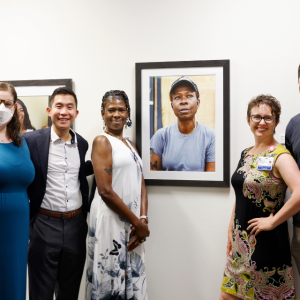Check out our news archive below to learn more about what’s happening in Duke Psychiatry & Behavioral Sciences!
Trailblazer Spotlight: Kafui Dzirasa
Duke Psychiatry's Kaf Dzirasa, MD, PhD, and his team focus on how genetic variants interact with environmental factors to lead to mental illness. He's also interested in how mechanisms in neural circuits underpin emotional behavior. He aims to design a pacemaker for the brain that can regulate the electrical signals underlying mental disorders.
International FOXP1 Conference Brings Together Researchers, Families Affected by Rare Genetic Condition
The Duke Center for Autism & Brain Development recently co-sponsored a first-of-its-kind conference to bring together interdisciplinary panels of researchers, clinicians, families, and patients affected by FOXP1 syndrome. FOXP1 results in significant developmental delays and is strongly correlated with autism.
Cannabis and Tobacco Use on the Rise, Especially Among Older Adults
The number of Americans using both cannabis and tobacco is increasing, with a particular surge among older adults, a new study finds. Researchers at Duke University School of Medicine who analyzed two decades of national data warn that the combination poses greater health risks than the dangers of using either substance alone.
Actor Melissa Gilbert Shares Reflections & Video about her Experience with Misophonia
Throughout her life, actor Melissa Gilbert has recoiled at the sounds of gum chewing and other everyday sounds—but she was well into adulthood before she discovered why she found these noises so distressing. Gilbert has misophonia, a disorder characterized by unusually strong sensitivity and reactivity to a particular trigger sound. She recently partnered with Zach Rosenthal, PhD, director of the Duke Center for Misophonia & Emotion Regulation, creating a brief video to promote awareness, provide hope, and invite people to help fund misophonia research and advocacy.
Study: Temporarily Removing Firearms from People at Risk of Harm Saves Lives
An estimated one life was saved for every 17 times an extreme risk protection order—known as ERPOs or “red flag laws"—removed guns from people who presented a risk of harming themselves or others, according to an analysis of the laws in four states, led by Duke Psychiatry's Jeffrey Swanson, PhD.
“Rockstar Women” Build Leadership in East Africa
Deborah Koltai, PhD, an associate professor of psychiatry, neurosurgery, and neurology, helped organize the first East African Women’s Leadership Consortium at the Kilimanjaro Christian Medical Centre in Moshi, Tanzania. A dozen women, representing universities and research facilities from Tanzania, Uganda, Rwanda, and Kenya, participated in the workshop, which was funded by the Duke Global Health Institute.
Giving Voice to Patients’ Untold Stories
Behind every electronic medical record is a human being with feelings, a story, and a voice. “Untold Stories” is a narrative medicine project on display at Duke University School of Medicine. Born out of a desire to connect more deeply with patients at the Duke Outpatient Clinic, internal medicine-psychiatry resident Jeffrey Lee, MD, created the initiative that blends storytelling and photography to uncover the personal experiences behind medical records.
New NIMH Training Grants Will Build Pipeline of Mental Health Scientists
Two new National Institute of Mental Health (NIMH) grants—a $1.1 million R25 awarded to Duke Psychiatry & Behavioral Sciences and a $1.7 million T32 awarded jointly to Duke Psychiatry & Behavioral Sciences and North Carolina Central University—will provide much-needed support toward filling critical gaps in research training opportunities in mental health and developmental neuroscience.
Providing Trauma-Informed Care for Patients while Supporting Colleagues and Each Other
For decades, Duke’s Department of Psychiatry & Behavioral Sciences has taken a multi-pronged approach to addressing trauma in the local and national community. More recently, the department has expanded its cadre of clinicians trained in providing trauma-informed care across the lifespan. This growth has led to better access to care for patients who have experienced trauma. It has also opened up opportunities to educate and support Duke clinicians in caring for these patients. And it’s created a tight-knit community of trauma experts who rely on each other for support, validation, and ongoing personal and professional development. The team’s efforts also extend beyond campus through engagement in local, national, and international community-led partnerships and initiatives.
Duke School of Medicine Joins National Effort to Foster Respectful Discourse in Medicine
Duke University School of Medicine has been selected to participate in a Kern National Network for Flourishing in Medicine national demonstration project to advance open inquiry and respectful discourse in academic medicine. The Duke task force will be led by Jane Gagliardi, MD, MHS; Melanie Bonner, PhD; Aditee Narayan, MD; and Joseph Jackson, MD. Gagliardi and Bonner are Duke Psychiatry faculty members.









